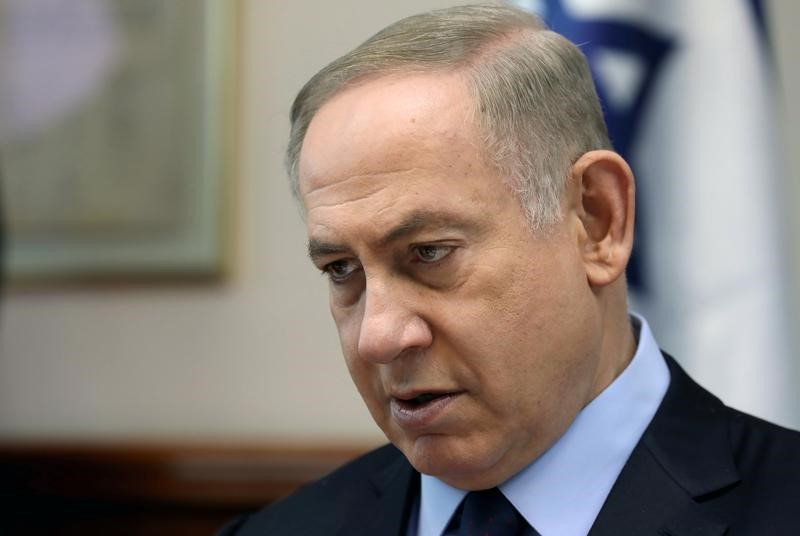By Luke Baker
JERUSALEM (Reuters) - Police questioned Prime Minister Benjamin Netanyahu for three hours under caution at his official residence in Jerusalem on Monday on suspicion of receiving gifts from businessmen in breach of his role as a public servant.
Part of a police statement issued after the questioning ended said that "investigators questioned PM Benjamin Netanyahu under caution on suspicion of receiving benefits." No additional details were initially given.
In questioning a suspect under caution, police investigators believe that the person they are interviewing has a case to answer.
The move to question the Israeli leader was authorised by Attorney General Avichai Mandelblit, who decided after a preliminary inquiry that there was enough evidence to open a criminal investigation.
Mandelblit issued a long statement which did not detail the matters being investigated but said the information warranted questioning under caution.
It also mentioned other suspicions which had been checked but did not yield evidence to warrant additional criminal enquiries.
"The nature of the investigation precludes us at this stage from giving details of the ongoing investigation but we will consider releasing more information from time to time according to developments," Mandelblit's statement said.
He added that investigation began three months ago but new, detailed information had come to light during the past month which supported questioning the prime minister under caution.
Before the questioning began, Netanyahu told his ruling Likud faction in parliament that those anticipating his downfall should not expect his imminent departure.
"Wait with the celebrations, don't rush," Netanyahu said. "I've said it before and I'll say it once again: there will be nothing because there is nothing."
Photographers were camped outside the heavily guarded residence, hoping to get pictures of investigators arriving. Black screens were erected inside the gates of the property to block the view.
Haaretz and other newspapers said the probe related to gifts worth "hundreds of thousands of shekels" ($1=3.85 shekels) given to Netanyahu by Israeli and foreign businessmen.
Channel 2, a commercial network, said the investigation was one of two cases now open against the prime minister, although it said details of the second remained unclear.
Netanyahu, 67, has been in power on and off since 1996. He is currently in his fourth term as prime minister and will become Israel's longest-serving leader if he stays in office until the end of next year.
He and his wife, Sara, have weathered several scandals over the years, including investigations into the misuse of state funds and an audit of the family's spending on everything from laundry to ice cream. They have denied any wrongdoing.
Netanyahu is not the first prime minister to be questioned in a criminal case.
Ehud Olmert, who held office from 2006 to 2009, is currently serving 18 months in prison after being convicted of breach of trust and bribery in 2014.
Former prime minister Ariel Sharon was questioned while in office in 2003 and 2004 over allegations of bribery and corruption involving him and his two sons. In 2006, his son Omri was convicted of corruption and served time in prison.
Netanyahu's police appointment drew a barrage of commentary from the centre-left opposition in parliament, with politicians calling for him to go. But Yair Lapid, leader of the centrist Yesh Atid party, said that for the good of the country, he hoped the prime minister would be cleared.
"I wish for him and his family, and the State of Israel, that we uncover that there was no fault in his behaviour. If two prime ministers in a row fall from office because of corruption, it will be very hard to rehabilitate the public's trust in its leadership."

Israeli commentators pointed out that while Netanyahu may be questioned, that has happened many times in the past and prime ministers have gone on governing, sometimes for years.